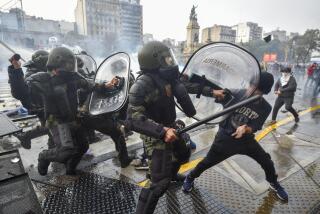Shaken Lawmakers Return to Palestinian Parliament
RAMALLAH, West Bank — Palestinian lawmakers returned to work amid an uneasy calm Tuesday after factional clashes stirred fears that rising tensions could spill into civil war.
Back-and-forth violence a day earlier between the Hamas and Fatah movements left two people dead and government buildings in the West Bank and Gaza Strip heavily damaged. Amid the disorder, Fatah gunmen briefly kidnapped and beat a Hamas lawmaker.
Broken glass and smashed computers littered the ground at the Hamas-led parliament in Ramallah, where members of Fatah, the party of Palestinian Authority President Mahmoud Abbas, had gone on a nighttime rampage.
Lawmakers there said they were shaken by the outburst of violence, which began with clashes in southern Gaza between Hamas militants and Fatah-dominated security forces and spread to Ramallah.
“It was a shock for all of us to see our people demolishing our own things,” said Hassan Khreisheh, an independent who ran as part of the Hamas ticket in parliamentary elections in January, the balloting that brought the radical Islamic group to power. “We used to destroy the property of Israelis because we are in a conflict, but it is shocking to see our people destroying our own things.”
Khreisheh and others said Palestinian leaders urgently needed to heal the rift by negotiating a shared political program that could bring Hamas and Fatah together.
“There are people acting outside the law, with violence and intimidation. That’s enough to get alarm bells ringing without civil war,” said Hanan Ashrawi of the Third Way party. “We need a national accord, national consensus, as soon as possible. We don’t have time.”
Saeb Erekat, a Fatah legislator who is the chief Palestinian negotiator, called the clashes “very alarming.”
“I’m really concerned as I have never been before, simply because this could deteriorate further,” he said.
Abbas and supporters want Palestinians to vote on a statehood plan that would implicitly recognize Israel, as Fatah does. Abbas sees the referendum as a way to break the deadlock over Hamas’ refusal to recognize the Jewish state and to end an international aid cutoff that has hurt the Palestinian economy and caused thousands of public employees to go unpaid for months.
Hamas, which sees the vote as an attempt to undermine its government, calls the referendum illegal.
The standoff has sharpened the months-long power struggle between Hamas and Fatah, which dominated Palestinian politics for decades until this year’s elections.
Khalil Rabai, the Hamas lawmaker abducted Monday, said there was still time for the two sides to work out their differences.
Rabai, who said he was bruised after being beaten by masked assailants, warned that an escalation of tensions would cause “very serious damage.”
“I still believe the Palestinian people are conscious enough not to go down that path,” he said.
More to Read
Sign up for Essential California
The most important California stories and recommendations in your inbox every morning.
You may occasionally receive promotional content from the Los Angeles Times.










